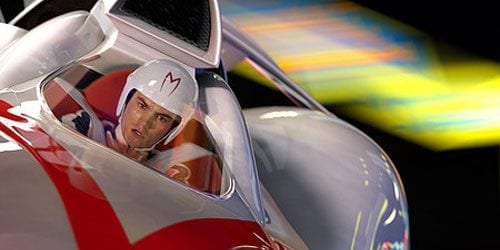
Speed Racer (Emile Hirsch) actually begins his live-action, giant-screen debut looking depressed. Surrounded by bright orange lockers, he slumps in deep thought, his back to the camera that then cuts to a close-up of his nervously tapping, red-socksed foot. Cut to what he’s remembering, himself as a cute little foot-tapping scamp (Nicholas Elia), nervously anticipating the end of class, utterly unable to comprehend the words on his exam paper. “Blah, blah, blah,” reads the page from his point of view, the first and only cute joke in Andy and Larry Wachowski’s Summer Movie.
Inspired by the mostly beloved late ’60s Japanese cartoon, Speed Racer is loud, large, and proudly crass. For every pseudo-angsty moment — Speed misses his dead brother Rex (Scott Porter), loves his mom (Susan Sarandon), contemplates the moon with his girlfriend Trixie (Christina Ricci) — the film offers a broadly antic, wholly obnoxious splat, usually courtesy of Speed’s little brother Spritle (Paulie Litt) and his pet, Chim Chim. Plainly designed to appeal to the film’s six-to-eight-year-old viewers, this duo enters the action whenever the semi-adult business gets a little too heavy, when Speed is wondering whether to sign a contract with the corporate king Royalton (Roger Allam), for instance, or looks about to kiss Trixie. The child and the chimp are resolutely outrageous — arms up, screams excruciating, appetites insatiable. And, as awkwardly inserted as their side-adventures may be, they set the film’s big brash tone.
This is too bad, as it underscores the film’s fragmentation into assorted unwieldy pieces, each soliciting a different audience segment and none fitting very neatly with any of the others. Kids may thrill to the colors and the cars crashing, some parents might feel nostalgic for the “Go, go Speed Racer” theme song, and Wachowskis fans may feel a rush at the seeming thematic retreading (Speed’s resistance to the matrix of conformity is almost nostalgic, when it isn’t clobbering you over the head with its irrelevance). For Speed, no matter his white, white suit, is a kind of One, recalling Neo when he broods, facing down the big bad matrix of corporate logos and fixed races, committed to winning the right way, by spinning and flipping the Mach 5, outfitted with defensive weapons.
Raised by his mom and Pops (John Goodman) to believe in himself and resist the hollow promises of money and fame, Speed is only briefly impressed by Royalton’s offer of a huge crew and machinery (this during a tour of a Willy Wonka-style car-building factory) as well as the promise that Racer Motors can continue to “run as an independent.” Speed dons the perfectly fitting dress suit Royalton gives him, nods soberly, and insists that he’ll think over the proposal. But he also holds fast to the ideal of car racing as a great, good enterprise in which “Cheaters Never Prosper” (as an instructive newspaper headline pronounces). Observing the rooms where workers super-quickly assemble vehicles and paint them blue and green, Speed begins to suspect that Royalton and other magnates do in fact cheat and win, aided by Pops’ wise aside: “I’m feeling more intimidated than impressed, people like you, with too much money, they start thinking the rules don’t apply.” Speed, of course, rejects the contract and so earns Royalton’s well-funded wrath.
This conflict initiates something like a plot, in which Speed drives his car. Invited to join a team headed by Taejo Togokahn (Korean pop singer Rain) and including the renowned but also unknown Racer X (Matthew Fox), Speed heads to the very location where Rex was killed. He does so secretly, with Trixie’s help, and he and his teammates achieve wondrous feats, unfettered by gravity or physics. Their progress is narrated, incessantly, by race announcers whose “global” diversity is comprised of a pile-on of race and nationality stereotypes, from British and Italian to German and “Asian.” The movie’s investment in white-Americanness is never more marked than when these ugly supporting figures fill the screen in humungo close-ups, rhapsodizing over the brilliance of Speed.
Suddenly, you’re feeling a long way from the Kansas of The Matrix. Speed is as offputting and graceless a superstar as Neo was odd and seductive. As the designated hero for bijillions of TV viewers, Speed is made splashy and flat, the once awesome technology of bullet-time transformed into hyper-hues — the track undulating, the crashes inconsequential, the enthusiastic crowds reduced to fields of blinking lights. In its devotion to such all-immersive but strangely dull effects, the movie starts to feel more intimidating than impressive, bludgeoning viewers into submission.
It is, at last, a tiresome ride, especially at two hours plus. If the Chim Chim gyrations don’t discourage you, a sidebar plot involving brutal, big-nosed, yellow-vested gangsters will recall the ever-depressing Dick Tracy. Speed has lessons to learn, most plainly articulated by Racer X (fond of unsubtle mouthfuls like, “You don’t jump into a QB8 to become a driver, you do it because you’re driven!”). Speed is a driver but he’s so much more. That is, he embodies the opposite of the film’s anti-corporate argument. He’s the Matrix victorious.

![Call for Papers: All Things Reconsidered [MUSIC] May-August 2024](https://www.popmatters.com/wp-content/uploads/2024/04/all-things-reconsidered-call-music-may-2024-720x380.jpg)



